Table of Contents
Security officers are the unsung heroes, the vigilant guardians who ensure everyone enjoys the event safely. But what exactly goes into this work? What are the responsibilities and challenges faced by event security personnel?
In this article, we’ll explore the vital duties of event security teams, delve into the essential skills required, and shine a light on the dedication and strategy that create safe, enjoyable environments at large gatherings.
Part A – The Foundation of Event Security: A Vital Role
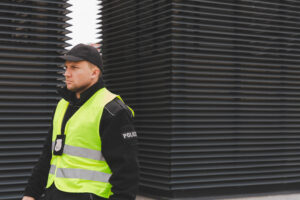
At any gathering, security isn’t just about keeping an eye on things; it’s about creating a sense of safety for all involved. Whether it’s a concert, sports event, corporate conference, or private party, event security officers have a comprehensive list of responsibilities designed to protect everyone present.
This responsibility involves proactive planning, keen situational awareness, crowd management, access control, and crisis response—all elements that ensure a smooth event where the focus remains on enjoyment, not danger.
Event security isn’t just about presence; it’s about a trained, professional team that’s ready for any contingency. According to ARDENT’s mission to professionalize the security industry, security at events is not just fulfilling a duty—it’s creating a professional standard of care that clients can rely on for safety and support.
Part B – Key Responsibilities of Event Security Officers
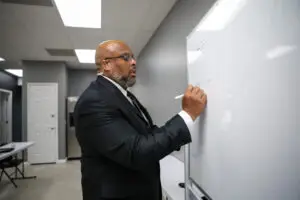
Event security officers are entrusted with numerous tasks, each critical in maintaining a secure environment. Here are the primary responsibilities they undertake:
1. Crowd Management and Control
- Managing crowd flow: Officers are trained to control crowd movement, especially at entrances, exits, and areas prone to bottlenecks. During large events, it’s essential to ensure that people can move freely without overcrowding.
- Preventing disturbances: Security staff handle individuals who may become disruptive or potentially violent, minimizing risks before situations escalate. With the right training, officers employ de-escalation techniques to diffuse tense situations effectively.
2. Access Control
- Monitoring entry points: Event security must vigilantly guard entrances to verify that only authorized attendees enter. This task can include ID checks, bag searches, and ticket validation, ensuring that only those who meet the event’s criteria are allowed inside.
- Managing VIP areas: VIP zones often require additional security measures to ensure exclusive access. Security officers must be discreet yet assertive, providing both privacy and protection to high-profile guests.
3. Emergency Preparedness and Response
- Developing response plans: Security teams work with event organizers to establish response protocols for emergencies. These plans outline procedures for evacuations, medical emergencies, and unexpected threats like fire or severe weather conditions.
- On-the-spot decision-making: Officers must remain calm under pressure, using their training to respond effectively to sudden incidents, such as a fire or crowd surge, ensuring everyone’s safety until emergency services arrive.
4. Patrol and Surveillance
- Constant monitoring: Security officers patrol the venue, both on foot and through surveillance technology. This visibility deters potential wrongdoers and allows officers to spot and address issues before they escalate.
- Real-time reporting: Effective security involves continuous communication and documentation. Officers maintain logs and report unusual activity immediately, ensuring that the security team operates cohesively and that issues are recorded for follow-up.
5. Customer Service and Public Relations
- Providing assistance: Event security often serves as a resource for attendees, answering questions and offering directions. Their approachability enhances guests’ comfort and trust in the security team.
- Maintaining professionalism: An essential aspect of ARDENT’s mission, professionalism entails treating all attendees with respect and dignity. Security officers serve as representatives of the event and the organizing company, so courtesy is critical to uphold the event’s reputation.
Part C – Essential Skills for Event Security Officers
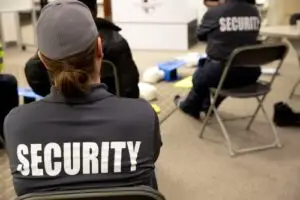
Event security officers need more than physical presence—they require specialized skills to adapt to dynamic environments and unexpected challenges.
1. Situational Awareness – Officers must remain highly alert, observing details that others might miss. Situational awareness enables officers to spot suspicious behavior and assess potential risks promptly.
2. Communication Skills – Effective communication is key in security work. Officers must be able to convey clear instructions to both team members and attendees, ensuring that everyone understands procedures, especially during emergencies.
3. Conflict Resolution and De-escalation – Event security involves handling a wide range of individuals. Officers trained in conflict resolution can manage tense situations without resorting to force, creating a safe and respectful environment for all.
4. Physical Fitness and Stamina – Event security demands physical readiness, from extended periods of standing and patrolling to managing emergencies. Officers must maintain a fitness level that allows them to perform all duties effectively.
5. Technical Proficiency – As technology becomes integral to security, officers must be adept at using surveillance tools, communication devices, and, where applicable, electronic access control systems. Familiarity with technology enables them to monitor large areas effectively and respond to incidents swiftly.
Part D – Preparing for the Unpredictable: Event Security Challenges
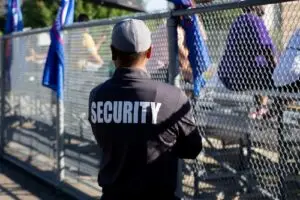
Even with detailed planning, event security officers must remain adaptable. Each event presents unique challenges:
- Unanticipated Crowd Surges: Concerts or sports events can see sudden, massive movements of people, especially during emergencies. Security officers must be prepared to implement emergency procedures to manage the crowd safely.
- Alcohol-Related Incidents: In events where alcohol is served, there’s a higher likelihood of disorderly conduct. Officers must manage these situations tactfully, balancing enforcement with sensitivity to prevent escalation.
- Dynamic Threats: In today’s world, threats can emerge suddenly, from natural disasters to unforeseen security risks. Event security personnel are trained to implement emergency protocols, guide attendees to safety, and work closely with law enforcement as needed.
Part E – The Importance of Training and Preparation in Event Security
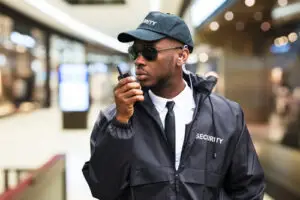
ARDENT’s commitment to professionalizing the security industry means that its officers are thoroughly trained in every facet of event security. Regular training sessions focus on core competencies, including:
- Emergency Protocols: Officers learn evacuation procedures, how to manage emergency communication, and the coordination required to work with first responders.
- Legal Knowledge: Understanding local laws regarding search, access control, and response protocols is vital for officers to perform their duties within legal bounds.
- Equipment Familiarity: Security officers use various tools, from communication devices to surveillance systems. Officers are trained to use this equipment effectively, ensuring they can respond promptly and accurately in any situation.
Conclusion: The Heartbeat of a Successful Event
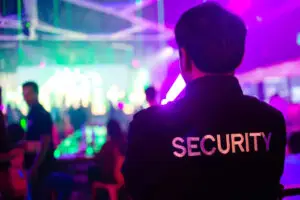
In many ways, event security is the heartbeat of a successful event—steady, reliable, and indispensable. Security officers are the silent force that allows the rest of the event to proceed without incident, ensuring attendees’ safety, fostering a sense of order, and allowing everyone to enjoy the experience without worry.
ARDENT believes that professionalizing the security industry means more than just doing a job well; it’s about setting a higher standard. Every security officer becomes part of the ARDENT mission to create safer environments through dedication, professionalism, and a commitment to excellence. If you’re planning an event, remember that the presence of well-trained, vigilant security officers is what keeps the celebration joyful and the memories safe.
Through their unwavering commitment, event security officers make a difference that often goes unnoticed—but that’s precisely what makes their work so impactful.
Quick Links
Resources
- Private Security
- Residential Security
- Corporate Events
- Retail & Loss Prevention
- Worksites & Warehouses
- Large Gatherings
- Health Providers & Clinics
- Hotels & Resorts
-
Cage#
8GY18 -
License#
B1900411 -
DUNS#
091352049


